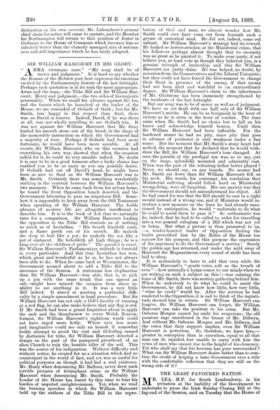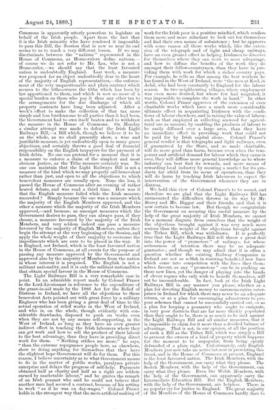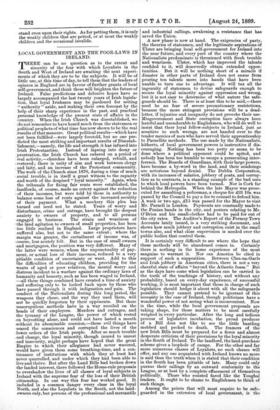THE LEAST FAVOURED NATION.
MR. LEA, M.P. for South Londonderry, in his irritation at the inability of the Government to undertake to press the Irish Sunday Closing Bill at the fag-end of the Session, said on Tuesday that the House of Commons is apparently utterly powerless to legislate on behalf of the Irish people. Apart from the fact that it is the Irish minority who have rendered it impossible to pass this Bill, the Session that is now so near its end seems to us to teach a very different lesson. If we may discriminate between the " nations " represented in the House of Commons, as Home-rulers define nations,— of course we do not refer to Mr. Lea, who is not a Home-ruler,—we should say that the least favoured nation is undoubtedly England. Last week, a measure was proposed for an object undoubtedly dear to the heart of the majority of English representatives,—the enforce- ment of the very unquestionable and plain contract which secures to the tithe-owners the tithe which has been by law apportioned to them, and which is now no more of a special burden on those who pay it than any other tax to the arrangements for the due discharge of which all property contracts have long been adjusted. After a week's effort to make the collection of that tax more simple and less burdensome to all parties than it had been, the Government had to own itself beaten and to withdraw the measure in the House of. Commons. On Monday a similar attempt was made to defeat the Irish Light Railways Bill,—a Bill which, though we believe it to be on the whole, as we shall presently show, a wise and justifiable measure, is yet undoubtedly open to many grave objections, and certainly throws a good deal of financial responsibility on the English taxpayers for the payment of Irish debts. No one can pretend for a moment that it is a measure to enforce a claim of the simplest and most obvious justice, as the Tithe measure certainly was. No one can maintain that the Light Railways Bill is not a measure of the kind which we may properly call benevolent rather than just, and open to all the objections to which benevolent measures are usually open. None the less, it passed the House of Commons after an evening of rather heated debate, and was read a third time. How was it that the English measure failed while the Irish measure succeeded ? Simply because the one was a measure which the majority of the English Members approved, and the other a measure which the majority of the Irish Members approved,—and because, as amongst measures which the Government desires to pass, they can always pass, if they choose, a measure favoured by the majority of the Irish Members, and very seldom indeed can pass a measure favoured by the majority of English Members, unless they begin the attempt at the very beginning of the Session, and apply the whole weight of their majority to overcome the impediments which are sure to be placed in the way. It is England, not Ireland, which is the least favoured nation in the House of Commons, at all events for the purpose of passing any measure approved by the Government and approved also by the majority of Members from the nation in whose interest it is proposed. The English is not a militant nationality, and it is only the militant nationalities that obtain special favour in the House of Commons.
The Light Railways Bill is a very remarkable case in point. In an admirable report made by Colonel Fraser to the Lord-Lieutenant in reference to the expenditure of the grant-in-aid made by the 1886 Act for the Relief of Distress in Ireland, we have all the objections to these benevolent Acts pointed out with great force by a military Engineer who has been giving a great deal of time to the actual operation of relief works in the West of Ireland, and who is, on the whole, though evidently with con- siderable drawbacks, disposed to push on works even when they are not by any means self-supporting, in the West of Ireland, so long as they have an even greater indirect effect in teaching the Irish labourers where they can get -work and how to sell the product of their labour to the best advantage, than they have in providing direct work for them. " Nothing strikes me more," he says, " than the extreme repugnance people here, as elsewhere, show to doing anything for themselves that they have the slightest hope Government will do for them. For this reason, I believe uncertainty as to what Government means to do in the matter of public works, paralyses private enterprise and delays the progress of self-help. Payments obtained half as charity and half as a right are seldom earned by marketable labour," and he quotes the remark of an Irish peasant who said he could not believe that another man had secured a contract, because of his setting to work " as if he was on day-wages." Colonel Fraser holds in the strongest way that the mere artificial making of work for the Irish poor is a positive mischief, which renders them more and more reluctant to look out for themselves and find their own means of subsistence ; but he approves with some reason all those works which, like the exten- sion of the telegraph and of light and cheap railways, have an even greater effect in helping Irishmen to discover for themselves where they can work to most advantage, and how to diffuse the benefits of the work they do amongst their fellow-countrymen, than they have in pro- viding them with work for which a richer country pays. For example, he tells us that among the best workers he has found in the West of Ireland, were "the men at Keel, in Achil, who had been constantly to England for the labour season. In two neighbouring villages, where employment was even more desired, but where few had migrated, it was impossible to complete the work in hand." In other words, Colonel Fraser approves of the extension of even charitable works which have a much more considerable ultimate effect in acquainting Irishmen with the condi- tions of labour elsewhere, and in raising the value of labour, such as that employed in collecting seaweed for agricul- tural use as manure, by enabling the products of labour to be easily diffused over a large area, than they have an immediate effect in providing work that could not be paid for by Irish capital alone. ColorA Fraser's general verdict is that telegraphs and light railways, even if guaranteed by the State, and so made charitable, will do more good than harm, because even when the tem- porary and artificial demand for labour which they cause is over, they will diffuse more general knowledge as to where industry can best find its rewards, and more means of rewarding local industry by securing a market for its pro- ducts far afield from its scene of operations, than they will do harm by teaching Irish labourers to expect the intervention of the Government whenever they are, in distress.
We hold this view of Colonel Fraser's to be sound, and therefore we are glad that the Light Railways Bill has surmounted the difficulties thrown in its way by Mr. Storey- and Mr. Biggar and their friends, and that it is now certain to become law. But though we congratulate the Government on securing this useful measure by the help of the great majority of Irish Members, we cannot for a moment disguise from ourselves that the weight of the objections brought against it was very much more serious than the weight of the objections brought against the Tithes Bill, which was withdrawn. It is perfectly true that the Light Railways Bill will throw a great deal into the power of " promoters " of railways, for whose seriousness of intention there may be no adequate guarantee ; and though we may admit that it is often a question whether the existing Railway Companies in Ireland are not as selfish in resisting beneficial new lines which come into competition with the lines they them- selves favour, as any " promoters " can be in pushing on those new lines, yet the danger of playing into the hands of clever rogues who only wish to benefit themselves, will not be inconsiderable. In fact, look at the Irish Light Railways Bill in any manner you please, whether as a plan for devoting English money to unremunerative enter- prises in Ireland for which there may never be an adequate return, or as a plan for encouraging adventurers to pro- pose schemes that cannot be successfully carried out, or as a plan for keeping a peasantry who ought to emigrate, in very poor districts that are far more thickly populated than they ought to be, there is so much to be said against the Light Railways Bill and all similar measures, that it is impossible to claim for it more than a decided balance of advantage. That is not, in our opinion, at all the position of such a Bill as the Tithes Bill, which was simply a Bill to prevent the owners of a kind of property which happens for the moment to be unpopular, from being openly defrauded of a plain right. Unfortunately, only English Members just now take an active interest in preventing this fraud, and in the House of Commons at present, England is the least favoured nation. The Irish Members, with the help of the Government, can carry what they please. The Scotch Members, with the help of the Government, can carry what they please. Even the Welsh Members, with the help of the Government, can apparently carry the Intermediate Education Bill. But the English Members, with the help of the Government, are helpless. There is no popular cry for justice to England. The great majority of the Members of the House of Commons hardly dare to stand even upon their rights. As for petting them, it is only the weakly children that are petted, or at most the weakly children and the occasional invalids.




































 Previous page
Previous page